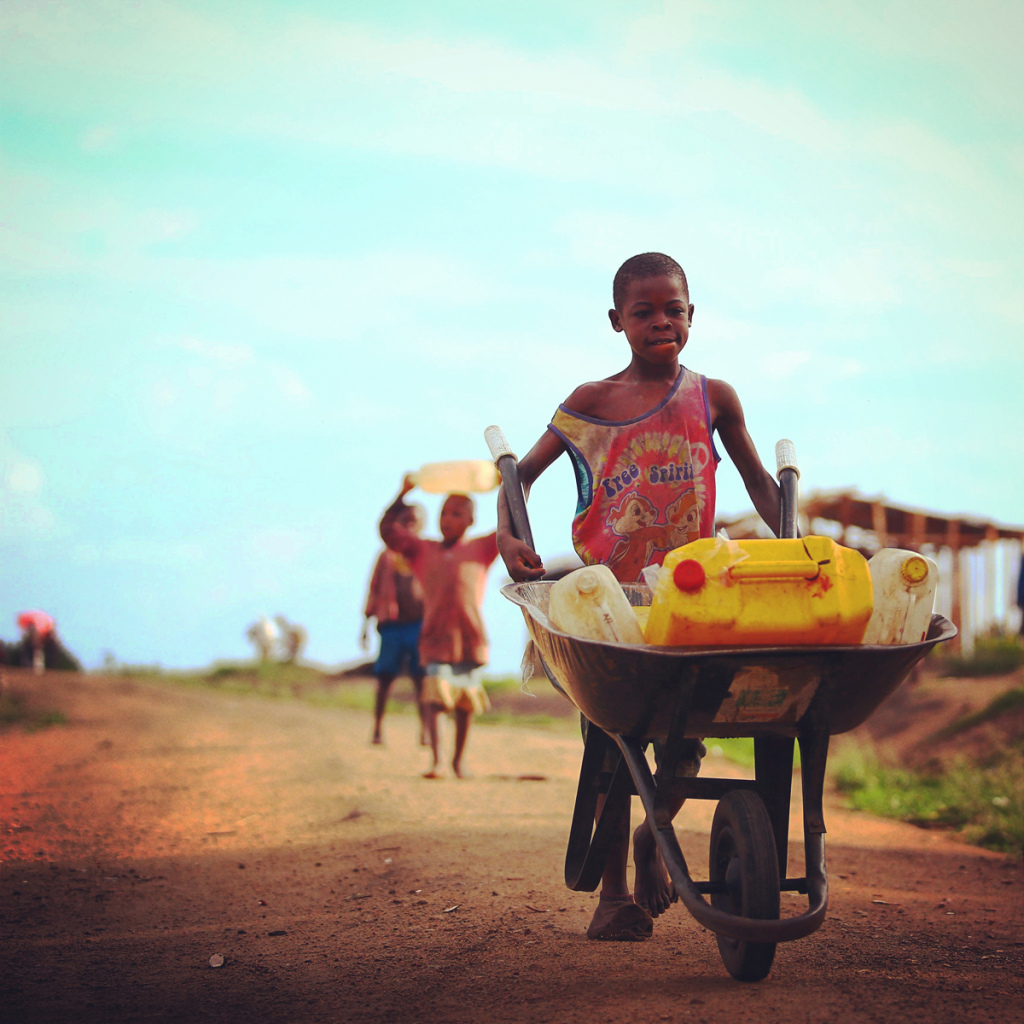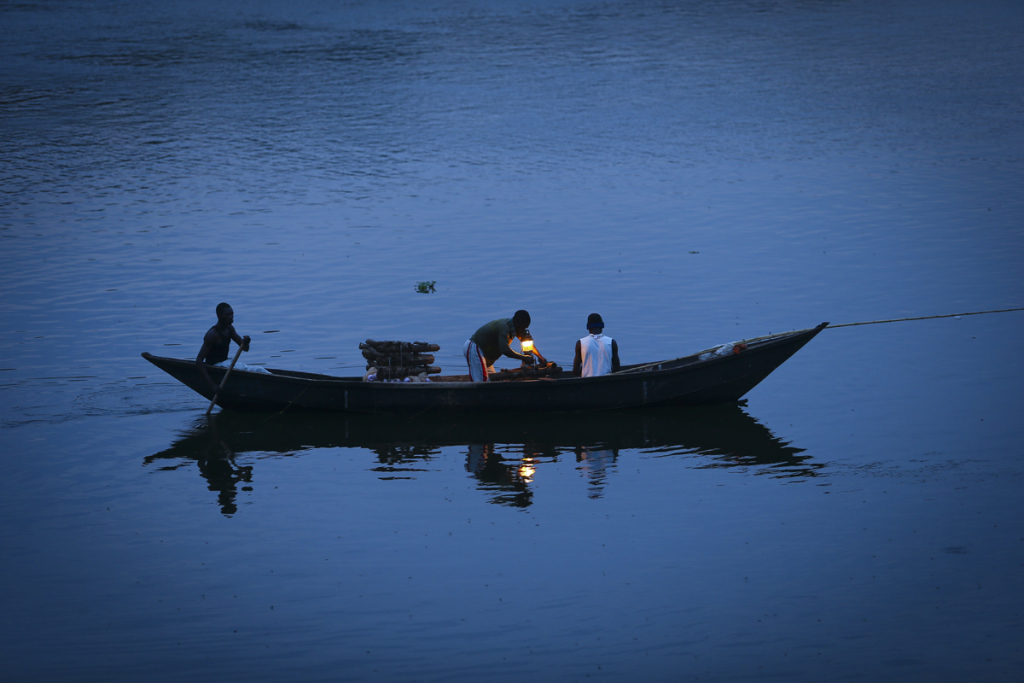
This is one of Edward Echwalus's photos of a boy pushing a wheelbarrow loaded with jerry cans full of water in Western Uganda. Photo used with permission.
The name Edward Echwalu [1] is quickly becoming synonymous with photography and blogging in Uganda. In an exclusive interview, the amazing photoblogger spoke to Global Voices about his love for photography and blogging.
Prudence Nyamishana (PN): When did it occur to you that photography was your thing?
Edward Echwalu (EE): I was like many Ugandan kids that didn’t know what my career path was headed even when I was in second year at Makerere University and like many Mass Communication students, I attended all the classes hoping that I would discover my passion along the way.
One day, a visiting professor from the USA came with his camera and encouraged us to integrate stories and photos. My life was completely changed. I immediately started taking pictures and compliments came from that direction. My passion was driven by that fact that my father had said that after my final semester at school, I would never see any of his money. I knew I had to earn a living. But I was glad that I had discovered my passion.
I took a bold step and from my tuition, boarded a bus to Nairobi, Kenya to buy a camera. I had been told that cameras are cheaper. I didn’t know anyone but that didn't stop me from going to buy a camera. I was very excited, I took photos of everything that came my way. But then I knew that I had to publicize my photos so I set up a blog and by then not many Ugandans were blogging. Part of my course had a design component so I designed business cards. And just before the semester closed, I was invited by the US embassy for an Editor’s meeting. It was an exclusive meeting with Editors of top-level media houses. I was only a student and the only portfolio I had was a link to my blog. So what I did out of excitement became my defining moment. And thereafter, I got many more emails from people that wanted me to do work for them including the Daily Monitor [2] that took me on as a their photographer.
PN: What has been your best moment as a photoblogger?
EE: They are quite a number of great moments but my best moment was when I received a call from London that I had been nominated for CNN African Journalism Awards. I didn’t know how to respond. The call came in when I was in a car with my friends going to party when I told them, the party started right there. For the first time I felt like somebody appreciated my work.

Night fishing with kerosene lamp is common in Uganda. Photo used with permission.
PN: What challenges do you face as a photoblogger?
EE: In Uganda people don’t appreciate talent. I keep pushing myself to do better work. At the university I didn’t learn much for most of what I know I learned from YouTube.
Equipment is very expensive and not available in Uganda yet photography here is easily unnoticed unless your work is exceptional. In journalism, photojournalists are always on the front line and yet in Uganda, they are not insured. Police have beaten me in my line of duty, I pursued the case but it fell off along the way. In 2009, during the Buganda riots [3], there was tension everywhere and every scene was a front-line the whole town was ablaze yet I wanted as many exclusive photos as possible. The Army was in charge so they started shooting at people- they arrested me and beat me I was taken to a police barracks where I was flogged. But there was no body to see me being beaten. Fortunately, I had airtime on my phone that was enough for a text message to my editor- who in turn sent a message that spread to many radio stations in Kampala- then the army men started wondering who I was and was released immediately. Then in 2011 during the “walk to work” [4]protests, I was downtown taking pictures of the protesters. The army me shot warning bullets in the sky before I knew it, one soldier opened fire on the crowd and I saw a young man that had been full of life shouting a in front of me dead. I was traumatized and raged. I took more pictures despite the beatings. And all I could do was tell the young man’s story.
PN: What is it like being a Ugandan photoblogger?
EE: Photoblogging has opened very many doors for me. I have power in the camera. I chose ideas that relate to my global audience. I use blogging to raise awareness of issues. For example the nodding syndrome [5]story that I covered in northern Uganda. The disease puzzled me; nobody seemed to have answers to it so I decided to travel to northern Uganda what I found there was shocking- I covered what it takes for a child to live with the disease. The response was overwhelming, people came up with ideas of how to get involved and as a result, there were campaigns to raise funds for the nodding syndrome. Media coverage increased internationally and locally. Photoblogging has helped me tell humanitarian stories that ordinarily would never appear in the mainstream media. Along the way, I found my niche I now do photography for development so I use more pictures and less words.
PN: I have seen many of your amazing pictures that tell the story even without reading the caption. How do you manage to capture these moments?
EE: I go out for emotions yet many photobloggers go for activity. When I capture the emotion I leave the field gratified. It is never easy capturing emotion it requires patience, time and skill. As a photographer you must be humane enough to tell the story. You need to feels what these people are feeling, with the nodding syndrome, I was angry I felt like the children deserved better.
PN: What keeps you going when things are falling apart?
EE: Photoblogging is my sustenance. I don’t have a physical office I have encouraged photojournalists to pursue photoblogging that what I earn on a project is 98% of my annual revenue if I had a daytime job. I decided that the many hours I was giving to my employer, I invest it in my job, I feel that I am yet to tell the best story of my life- I don’t feel like I have taken my best picture yet. And for a long time, I used never to take compliments. Sometimes when I compare myself with other photographers around the world I know that I am not yet there so I have to keep pushing myself to the limits.
Yes, times have been tough when I lost my morale for any work. I felt like my work was not very impactful. I spoke to my mentor who told me to take a step back and for the first time in my career for a whole month, I did not click a camera, I didn’t take any picture and didn’t carry a camera or smart phone. I went on a wild adventure. Temptations came along the way but I used this season to jump-start my life and when the one month was over, I was ready for a fresh start. Then there is a time when my equipment was stolen; all my cameras, backup hard drives yet that was my life. I felt amputated. It took good encouragement to get me back to my feet. Friends organized and fund-raised about 2000 dollars contributions came from allover the world; Brazil, Ghana, Ethiopia US and many other countries. That was another defining moment, because I had global voices that were encouraging me to go on.
PN: What can you tell a blogger out there that is about to give up or has already given up on their blog?
EE: Giving up on a blog is like giving up on life. Whatever reasons made you open up a blog should keep you going. Many bloggers give up because they are not getting enough feedback but you have no idea that your blog might have been changing a life somewhere, even if it was one person that is all that matters. Sometimes we get discouraged over things that do not matter. Don’t lay your tools down; there are people out there that are feeding from your thoughts. Keep going.
Edward's work can be found here [1].